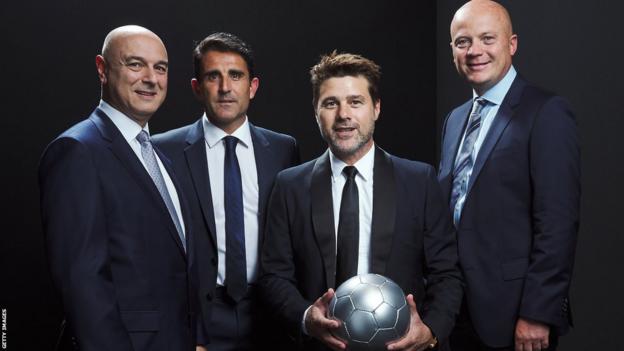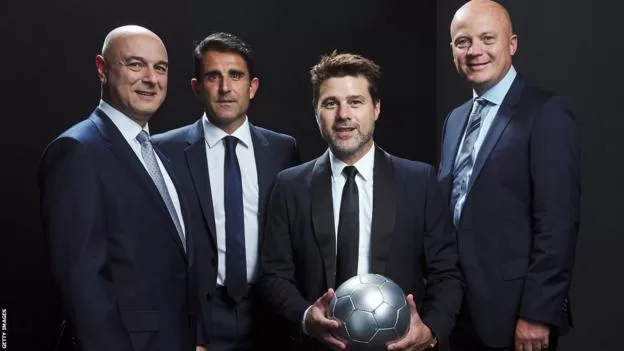
As the January transfer window comes to a close, it is not just the deals themselves that attract attention, it’s the strategy behind them.
Whether it is the clear planning at Brighton, the big-spending approach at Chelsea, the focus at Manchester City or chaos at Manchester United, it seems everyone has an opinion on recruitment.
Steve Hitchen spent time as a scout at Liverpool, QPR and Derby but is chiefly known for his five years at Tottenham, where he earned huge respect after advancing to the technical director role, working to chairman Daniel Levy.
Hitchen left Spurs in February 2022 following the arrival of Fabio Paritici and has joined the established Unique Sports Group agency as director of football, which looks after numerous high-profile players including Chelsea skipper Reece James and Newcastle forward Anthony Gordon.
Hitchen spoke to BBC Sport’s Simon Stone about Premier League recruitment.
Why is recruitment so difficult? Why do Brighton in particular make it look so easy?
If you have a common way of working, you know your market and the standard of football you are going to play, you are halfway there.
Man City’s success rate after Pep Guardiola came in went up dramatically. Why? Because they had a group of people in Txiki Begiristain, Ferran Soriano, Pep and others who all had a clear idea of what type of player they were looking for.
So consistency, success and money all combined for them.
If you look at Manchester United, which is my club from my childhood, they have lost that consistency.
You don’t know who the coach is going to be from one season to the next. If you have no clear identity through different types of managers, how can you have a clear philosophy when you are trying to recruit players?
Most new coaches want three or four of their own players. All of a sudden you have four different types of players that probably don’t marry with the next coach and what he is looking for. That breeds inconsistency.
We had it at Tottenham. We went from Mauricio Pochettino to Jose Mourinho. Two amazing coaches but two totally different philosophies. If they had gone from Jose to Antonio Conte directly, with Jose’s players and Antonio’s players, it probably would have worked.
If you had gone from Mauricio’s players to Ange’s Postecogolou’s players it definitely would have worked because they are similar in outlook. Brighton have a clear football philosophy. The manager has to fit that philosophy. As a consequence, you get a clear idea of what type of player works for Brighton.
What do clubs look for in players?
I had no plans to work for an agency but I liked the people. Clubs offer you a lot of responsibility, but when you scratch the surface you realise that you are not going to be given it. You could see how dysfunctional some of the clubs were that I spoke to, at home and abroad.
The people inside this agency are giving me the freedom and scope to do different things than I have done inside a football club and also bring more football club aspects into the agency.
The game is evolving. All clubs, even the biggest clubs, are looking for ‘business’ players, under the age of 24 with resale value.
We work off the same characteristics that we have for 10 or 15 years, physical, mental, technical, tactical, but there are different ways of building and playing within each team. I have this big thing about scouting, there has to be a mix.
We have to go with the data to back up what the eyes are saying. Data can give you a lot of metrics but the reality is the person on the ground, who speaks to people, who knows how the player is in training, how he behaves, how he is off the pitch, is just as important as the data and agents know the player better than the club because they are their clients.
Working with Daniel Levy?
Daniel takes a lot of criticism but he is one of the best to work with in terms of at least you know where you are. Even at the end it was good. He understood why I wanted to leave.
He is quite fair. He fights and fights and fights but in the end, both parties have to be happy otherwise the deal doesn’t happen. He normally gets what he wants and the player gets what he wants.
Navigating through the agent world
There is no getting away from it, there are bad agents out there and they give everyone else a bad reputation. Like most aspects of life, where there is money there is greed and where there is greed you will get certain characters that shouldn’t be in the game.
But I can honestly say inside this group I am surprised. When you get to know the bigger agents inside the company, who are working with the younger players, they genuinely care.
From the other side, working inside a club, I know there are a lot of guys who are just there to make money as fast as they can. They don’t care about the player. Two or three times at Tottenham we had a player who signed and then come to see me and said ‘this guy has done this and it wasn’t correct’ and we have had to take care of it because false promises have been made.
Tactical view
There is too much of everyone trying to play the same way. A lot of coaches want to express themselves like Pep and show these characteristics.
I think the Premier League has always been the best because it has had such contrasts. If you go to watch a game in La Liga, it doesn’t matter who plays it is more or less the same football. We have to be careful we don’t go down the same route in the Premier League.
It is nice to see Brentford sometimes play the way they do, with low blocks and being very good on set-pieces. It’s effective football. There is still a place for that in the Premier League.
Financial restrictions on spending
I fight myself about financial fair play rules (FFP). I see the benefits of it, with all the problems through the pyramid where clubs have ownerships who don’t have the money to back up their ideas.
But by the same token, we don’t want Man City to win the league every year and [also] for there never to be another Man City. Why can’t Newcastle do what Man City did and compete? It is a big issue that football clubs can’t have the freedom to trade.”


